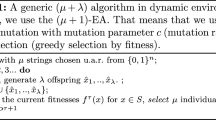Abstract
We consider the (1+1) Evolution Strategy, a simple evolutionary algorithm for continuous optimization problems, using so-called Gaussian mutations and the 1/5-rule for the adaptation of the mutation strength. Here, the function \(f\colon\mathbb{R}^{n}\to\mathbb{R}\) to be minimized is given by a quadratic form f(x) = x ⊤ Qx, where Q ∈ ℝn×n is a positive definite diagonal matrix and x denotes the current search point. This is a natural extension of the well-known Sphere-function (Q=I). Thus, very simple unconstrained quadratic programs are investigated, and the question is addressed how Q effects the runtime. For this purpose, quadratic forms
with ξ=ω(1), i. e. 1/ξ→0 as n→∞, and ξ=poly(n) are investigated exemplarily. It is proved that the optimization very quickly stabilizes and that, subsequently, the runtime (defined as the number of f-evaluations) to halve the approximation error is Θ(ξ
 n). Though ξ
n). Though ξ
 n=poly(n), this result actually shows that the evolving search point indeed creeps along the “gentlest descent” of the ellipsoidal fitness landscape.
n=poly(n), this result actually shows that the evolving search point indeed creeps along the “gentlest descent” of the ellipsoidal fitness landscape.
Preview
Unable to display preview. Download preview PDF.
Similar content being viewed by others
References
Beyer, H.-G.: Towards a theory of evolution strategies: Progress rates and quality gain for (1+, λ)-strategies on (nearly) arbitrary fitness functions. In: Davidor, Y., Männer, R., Schwefel, H.-P. (eds.) PPSN 1994. LNCS, vol. 866, pp. 58–67. Springer, Heidelberg (1994)
Beyer, H.-G.: On the performance of (1, λ)-evolution strategies for the ridge function class. IEEE Transactions on Evolutionary Computation 5(3), 218–235 (2001a)
Beyer, H.-G.: The Theory of Evolution Strategies. Springer, Heidelberg (2001b)
Bienvenue, A., Francois, O.: Global convergence for evolution strategies in spherical problems: Some simple proofs and difficulties. Theoretical Computer Science 306, 269–289 (2003)
Droste, S., Jansen, T., Wegener, I.: On the analysis of the (1+1) evolutionary algorithm. Theoretical Computer Science 276, 51–82 (2002)
Giel, O., Wegener, I.: Evolutionary algorithms and the maximum matching problem. In: Alt, H., Habib, M. (eds.) STACS 2003. LNCS, vol. 2607, pp. 415–426. Springer, Heidelberg (2003)
Greenwood, G.W., Zhu, Q.J.: Convergence in evolutionary programs with self-adaptation. Evolutionary Computation 9(2), 147–157 (2001)
Hansen, N., Ostermeier, A.: Adapting arbitrary normal mutation distributions in evolution strategies: The covariance matrix adaptation. In: Proc. of the IEEE Int’l Conference on Evolutionary Computation (ICEC), pp. 312–317 (1996)
Hoeffding, W.: Probability inequalities for sums of bounded random variables. American Statistical Association Journal 58(301), 13–30 (1963)
Hofri, M.: Probabilistic Analysis of Algorithms. Springer, Heidelberg (1987)
Jägersküpper, J.: Analysis of a simple evolutionary algorithm for the minimization in euclidean spaces. Technical Report CI-140/02, Univ. Dortmund, SFB 531 (2002), http://sfbci.uni-dortmund.de →Publications→Tech-Reports.
Jägersküpper, J.: Analysis of a simple evolutionary algorithm for minimization in Euclidean spaces. In: Baeten, J.C.M., Lenstra, J.K., Parrow, J., Woeginger, G.J. (eds.) ICALP 2003. LNCS, vol. 2719, pp. 1068–1079. Springer, Heidelberg (2003)
Neumann, F., Wegener, I.: Randomized local search, evolutionary algorithms, and the minimum spanning tree problem. In: Deb, K., et al. (eds.) GECCO 2004. LNCS, vol. 3102, pp. 713–724. Springer, Heidelberg (2004)
Rechenberg, I.: Evolutionsstrategie. Frommann-Holzboog, Stuttgart (1973)
Rudolph, G.: Convergence Properties of Evolutionary Algorithms. Verlag Dr. Kovač, Hamburg (1997)
Scharnow, J., Tinnefeld, K., Wegener, I.: Fitness landscapes based on sorting and shortest paths problems. In: Guervós, J.J.M., Adamidis, P.A., Beyer, H.-G., Fernández-Villacañas, J.-L., Schwefel, H.-P. (eds.) PPSN 2002. LNCS, vol. 2439, pp. 54–63. Springer, Heidelberg (2002)
Schwefel, H.-P.: Evolution and Optimum Seeking. In: Fülöp, Z., Gecseg, F. (eds.) ICALP 1995. LNCS, vol. 944, pp. 64–78. Springer, Heidelberg (1995)
Wegener, I.: Theoretical aspects of evolutionary algorithms. In: Orejas, F., Spirakis, P.G., van Leeuwen, J. (eds.) ICALP 2001. LNCS, vol. 2076, pp. 64–78. Springer, Heidelberg (2001)
Author information
Authors and Affiliations
Editor information
Editors and Affiliations
Rights and permissions
Copyright information
© 2005 Springer-Verlag Berlin Heidelberg
About this paper
Cite this paper
Jägersküpper, J. (2005). Rigorous Runtime Analysis of the (1+1) ES: 1/5-Rule and Ellipsoidal Fitness Landscapes. In: Wright, A.H., Vose, M.D., De Jong, K.A., Schmitt, L.M. (eds) Foundations of Genetic Algorithms. FOGA 2005. Lecture Notes in Computer Science, vol 3469. Springer, Berlin, Heidelberg. https://doi.org/10.1007/11513575_14
Download citation
DOI: https://doi.org/10.1007/11513575_14
Publisher Name: Springer, Berlin, Heidelberg
Print ISBN: 978-3-540-27237-3
Online ISBN: 978-3-540-32035-7
eBook Packages: Computer ScienceComputer Science (R0)




